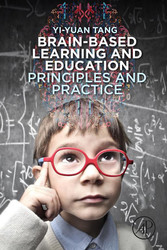
Brain-Based Learning and Education - Principles and Practice

von: Yi-Yuan Tang
Elsevier Reference Monographs, 2017
ISBN: 9780128105092
Sprache: Englisch
81 Seiten, Download: 3252 KB
Format: PDF, auch als Online-Lesen
Brain-Based Learning and Education bridges the research and application gap in education, not only covering the latest findings related to learning and teaching, but also providing insights for application and practice of brain-based methods in health and education.
Our current education system is based on content-knowledge, reading, writing, and math, but virtually ignores character strengths that are critical for children to go on to lead fully rounded, successful lives. Presenting a brain-based learning and teaching approach, this book discusses essential character strengths, including self-control, persistence, creativity, attention, memory, and social learning.
This integration of neuroscience and education takes us from a deep understanding of brain function to the frontlines of the classroom.
- Explains an integrative training mechanisms from the behavioral, neuroscientific, and physiological perspectives
- Presents brain-based practice methods that can be readily applied to the education system
- Addresses additional issues, such as stress, wandering mind, and individuality
- Includes stories and findings related to the brain, learning, and teaching
Dr. Yi-Yuan Tang is a Professor of Psychological Sciences, Presidential Endowed Chair in Neuroscience at Texas Tech University and founding Director of Texas Tech Neuroimaging Institute. He is also Professor of Internal Medicine at TTU Health Science Center, Adjunct Professor of Psychology, University of Oregon. He is Fellow of Association for Psychological Sciences (APS), Fellow of American Psychological Association (APA) and Associate Editor, Social Cognitive and Affective Neuroscience. Dr. Tang's basic research covers cognitive, social and affective neuroscience/psychology, for example, brain mechanisms of attention, mathematics, language, decision-making and creativity, learning or training related neuroplasticity. He applies behavioral, multimodal neuroimaging, psychophysiology and genetic analyses in his research. In his translational work, he develop a novel mindfulness based preventive intervention (Integrative Body-Mind Training, IBMT) and have studied its effects in large randomized clinical trials in healthy and patient populations in China and the U.S. since 1990's. Research indicate that IBMT intervention reduces stress, improves attention and cognitive performance, emotion regulation and immune function, social behavior and neuroplasticity over the life span. He has applied IBMT in addiction, mood disorders, ADHD, MCI and TBI.







